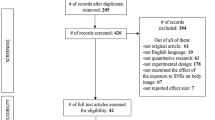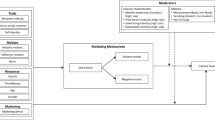Abstract
In this research, the effects of self-control exercises on impulse buying urges are examined. Drawing on the strength model of self-control (Baumeister and Heatherton 1996, Psychological Inquiry 7:1–15), the present paper aims to shed light on impulsive buying by exploring the impact of enhancement of self-control as a result of repeated physical and cognitive self-control exercises over time. The findings showed that these self-control exercises reduced impulse buying urges. Directions for future research are discussed.
Similar content being viewed by others
References
Baumeister, R. F. (2002). Yielding to temptation: self-control failure, impulsive purchasing, and consumer behavior. Journal of Consumer Research, 28, 670–676.
Baumeister, R. F., & Heatherton, T. F. (1996). Self-regulation failure: an overview. Psychological Inquiry, 7, 1–15.
Baumeister, R. F., Bratslavsky, E., Muraven, M., & Tice, D. M. (1998). Ego depletion: is the active self a limited resource? Journal of Personality and Social Psychology, 74(5), 1252–1265.
Baumeister, R. F., Muraven, M., & Tice, D. M. (2000). Ego depletion: a resource model of volition, self-regulation, and controlled processing. Social Cognition, 18(2), 130–150.
Baumeister, R. F., Gaillot, M., DeWall, C. N., & Oaten, M. (2006). Self-regulation and personality: how interventions increase regulatory success, and how depletion moderates the effects of traits on behavior. Journal of Personality, 74(6), 1773–1802.
Beatty, S. E., & Ferrell, M. E. (1998). Impulse buying: modeling its precursors. Journal of Retailing, 74(2), 169–191.
Bruyneel, S., Dewitte, S., Vohs, K. D., & Warlop, L. (2006). Repeated choosing increases susceptibility to affective product features. International Journal of Research in Marketing, 23, 215–225.
Bruyneel, S., Dewitte, S., Franses, P. H., & Dekimpe, M. G. (2009). I felt low and my purse feels light: depleting mood regulation attempts affect risk decision making. Journal of Behavioral Decision Making, 22, 153–170.
Clarkson, J. J., Hirt, E. R., Jia, L., & Alexander, M. B. (2010). When perception is more than reality: The effects of perceived versus actual resource depletion on self-regulatory behavior. Journal of Personality and Social Psychology, 98(1), 29–46.
Dholakia, U. M. (2000). Temptation and resistance: an integrated model of consumption impulse formation and enactment. Psychology and Marketing, 17, 955–982.
Dholakia, U. M., Gopinath, M., & Bagozzi, R. P. (2005). The role of desires in sequential impulsive choices. Organizational Behavior and Human Decision Processes, 98, 179–194.
Dholakia, U. M., Gopinath, M., Bagozzi, R. P., & Nataraahan, R. (2006). The role of regulatory focus in the experience and self-control of desire for temptations. Journal of Consumer Psychology, 16, 163–175.
Faber, R. J., & Vohs, K. D. (2004). To buy or not to buy?: self-control and self-regulatory failure in purchase behavior. In R. F. Baumeister & K. D. Vohs (Eds.), Handbook of self-regulation: research, theory, and applications (pp. 509–524). New York: Guilford Press.
Fennis, B. M., Janssen, L., & Vohs, K. D. (2009). Acts of benevolence: a limited-resource account of compliance with charitable requests. Journal of Consumer Research, 35, 906–924.
Gailliot, M. T., & Baumeister, R. F. (2007). The physiology of willpower: linking blood glucose to self-control. Personality and Social Psychology Review, 11, 303–327.
Gailliot, M. T., Baumeister, R. F., DeWall, C. N., Maner, J. K., Plant, E. A., Tice, D. M., et al. (2007). Self-control relies on glucose as limited energy source: willpower is more than a metaphor. Journal of Personality and Social Psychology, 92, 325–336.
Herabadi, A. G., Verplanken, B., & van Knippenberg, A. (2009). Consumption experience of impulsive buying in Indonesia: emotional arousal and hedonistic considerations. Asian Journal of Social Psychology, 12, 20–31.
Hoch, S. J., & Loewenstein, G. F. (1991). Time-in-consistent preferences and consumer self-control. Journal of Consumer Research, 17(4), 492–507.
Inzlicht, M., & Gutsell, J. N. (2007). Running on empty: neural signals for self-control failure. Psychological Science, 18, 933–937.
Joireman, J., Sprott, D. E., & Spangenberg, E. R. (2005). Fiscal responsibility and consideration of future consequences. Personality and Individual Differences, 39, 1159–1168.
Martijn, C., Tenbült, P., Merckelbach, H., Dreezens, E., & de Vries, N. K. (2002). Getting a grip on ourselves: challenging expectancies about loss of energy after self-control. Social Cognition, 20, 441–460.
Metcalfe, J., & Mischel, W. (1999). A hot/cool-system analysis of delay of gratification: dynamics of willpower. Psychological Review, 106, 3–19.
Mischel, W., Shoda, Y., & Rodriguez, M. L. (1989). Delay of gratification in children. Science, 244(4907), 933–938.
Mogelonsky, M. (1998). Keep candy in the aisles. American Demographics, 20(July 1), 32.
Muraven, M., Tice, D. M., & Baumeister, R. F. (1998). Self-control as a limited resource: regulatory depletion patterns. Journal of Personality and Social Psychology, 74, 774–789.
Muraven, M., Baumeister, R. F., & Tice, D. M. (1999). Longitudinal improvement of self-regulation through practice: Building self-control strength through repeated exercise. The Journal of Social Psychology, 139, 446–457.
Nenkov, G. Y., Inman, J. J., & Hulland, J. (2008). Considering the future: the conceptualization and measurement of elaboration on potential outcomes. Journal of Consumer Research, 35, 126–141.
Oaten, M., & Cheng, K. (2005). Academic examination stress impairs self-control. Journal of Social and Clinical Psychology, 24, 254–279.
Oaten, M., & Cheng, K. (2006a). Longitudinal gains in self-regulation from regular physical exercise. British Journal of Health Psychology, 11, 717–733.
Oaten, M., & Cheng, K. (2006b). Improved self-control: the benefits of a regular program of academic study. Basic and Applied Social Psychology, 28, 1–16.
Oaten, M., & Cheng, K. (2007). Improvements in self-control from financial monitoring. Journal of Economic Psychology, 28, 487–501.
Richeson, J. A., Baird, A. A., Gordon, H. L., Heatherton, T. F., Wyland, C. L., Trawalter, S., et al. (2003). An fMRI investigation of the impact of interracial contact on executive function. Nature Neuroscience, 6, 1323–1328.
Rook, D. W. (1987). The buying impulse. Journal of Consumer Research, 14, 189–199.
Rook, D. W., & Fisher, R. J. (1995). Normative influences on impulsive buying behavior. Journal of Consumer Research, 22, 305–313.
Schmeichel, B. J. (2007). Attention control, memory updating, and emotion regulation temporarily reduce the capacity for executive control. Journal of Experimental Psychology: General, 136, 241–255.
Schmeichel, B. J., Vohs, K. D., & Baumeister, R. F. (2003). Intellectual performance and ego depletion: role of the self in logical reasoning and other information processing. Journal of Personality and Social Psychology, 85, 33–46.
Schmeichel, B. J., Volokhov, R. N., & Demaree, H. A. (2008). Working memory capacity and the self-regulation of emotional expression and experience. Journal of Personality and Social Psychology, 95, 1526–1540.
Shiv, B., & Fedorikhin, A. (1999). Heart and mind in conflict: the interplay of affect and cognition in consumer decision making. Journal of Consumer Research, 26, 278–292.
Strack, F., & Deutsch, R. (2004). Reflective and impulsive determinants of social behavior. Personality and Social Psychology Review, 8, 220–247.
Stroop, J. R. (1935). Studies of interference in serial verbal reactions. Journal of Experimental Psychology, 18, 643–662.
Tangney, J. P., Baumeister, R. F., & Boone, A. L. (2004). High self-control predicts good adjustment, less pathology, better grades, and interpersonal success. Journal of Personality, 72, 271–324.
Verplanken, B., & Herabadi, A. (2001). Individual differences in impulsive buying tendency: feeling and no thinking. European Journal of Personality, 15, S71–S83.
Vohs, K. D. (2006). Self-regulatory resources power the reflective system: evidence from five domains. Journal of Consumer Psychology, 16, 215–221.
Vohs, K. D., & Faber, R. J. (2007). Spent resources: self-regulatory resource availability affects impulse buying. Journal of Consumer Research, 33(4), 537–547.
Vohs, K. D., & Heatherton, T. F. (2000). Self-regulatory failure: a resource-depletion approach. Psychological Science, 11(3), 249–254.
Vohs, K. D., Baumeister, R. F., Schmeichel, B. J., Twenge, J. M., Nelson, N. M., & Tice, D. M. (2008). Making choices impairs subsequent self-control: a limited-resource account of decision making, self-regulation, and active initiative. Journal of Personality and Social Psychology, 94, 883–898.
Author information
Authors and Affiliations
Corresponding author
Rights and permissions
About this article
Cite this article
Sultan, A.J., Joireman, J. & Sprott, D.E. Building consumer self-control: The effect of self-control exercises on impulse buying urges. Mark Lett 23, 61–72 (2012). https://doi.org/10.1007/s11002-011-9135-4
Published:
Issue Date:
DOI: https://doi.org/10.1007/s11002-011-9135-4




